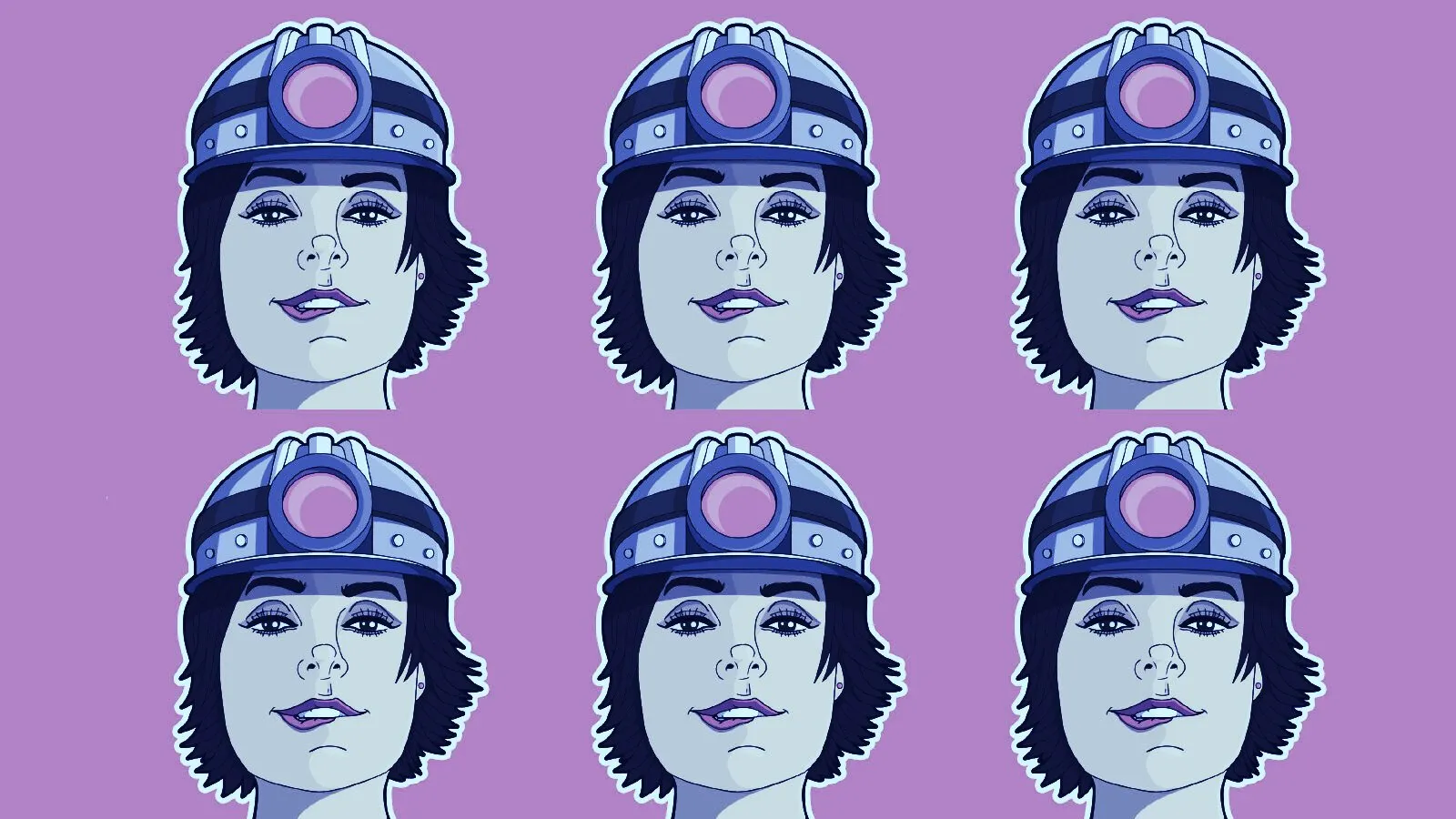Among the debris of discarded mining rigs, in the depths of crypto winter, a war is raging among miners—and one developer is at the heart of it: Kristy-Leigh Minehan.
Minehan (@OhGodAGirl on Twitter) is the face of ProgPoW—a proposed upgrade to the Ethereum blockchain that’s, arguably, the most contentious since the chain was forced to fork in 2016 when consensus could not be reached.
ProgPoW would make changes to the Ethereum hashing algorithm, Ethash, which would narrow the performance gap between generalized and specialized mining hardware. The contentious part is that it tilts the balance in favour of GPU miners, who have been disadvantaged by the hashing power of specialized and expensive-to-produce ASIC rigs. In fact, it would threaten to make the latter redundant and unusable.
That’s angering a lot of ASIC miners, though it’s unclear exactly how many work on the Ethereum blockchain. (Minehan has her own estimates, which she won’t divulge.) What is certain is that the move to introduce ProgPoW is causing a firestorm within the wider Ethereum community. Indeed, it’s so contentious that the matter was put to a historic vote last week, which is expected to conclude when consensus emerges—which some say is after more than 5 percent of the mining community votes (only nodes can vote, not pools of miners). In fact (somewhat confusingly) there are no less than three voting platforms. Early results, on Ethereum’s dedicated portal, show a majority in favor of the change. But no end date has been set, and results are not binding.
Beneath the surface
So what’s the fuss all about?
The “mom-and-pop stores” of crypto mining, GPUs are in trouble from rival Walmart-analogous ASICs. These big boys have, for some time, been scooping up the lion’s share of the earnings from mining the Ethereum blockchain. GPU-makers, the biggest of which are NVIDIA and AMD, have seen big falls in profits, and hundreds of mining facilities have shut down.
ASICS make a mockery of Satoshi’s crypto manifesto (“one CPU one vote”) since, unlike GPUs, they’re optimized to solve one algorithm, which they often do in giant, powerful mining pools. ASICs put hashpower in the hands of miners. The world’s leading ASIC manufacturer and operator, China-based Bitmain, which makes the expensive mining machines, can organize mining pools and leverage economies of scale. The Ethereum blockchain was designed to be ASIC-resistant, but developers didn’t figure on Bitmain introducing the all-powerful Antminer E3.
So, in June 2018, when the Ethereum core community was introduced to ProgPow, many saw an opportunity to trounce the mighty ASICs and reverse the status quo.
To put it simply, ProgPoW optimizes Ethereum’s algorithm so that GPUs can mine to capacity, while ASICs are disadvantaged. Its dominant feature, a “random mass,” changes the algorithm every 12.5 minutes. (Hence, the name, ProgPow, a portmaneau for “Programmable Proof of Work.”) While not as powerful or expensive as ASICs, GPUs can be automatically reprogrammed on the fly, and adjust rapidly to the ever-changing algorithm; by comparison, ASICs would require costly manual reprogramming and would lose their advantage.
Minehan, leading a small tribe of PoW and hardware enthusiasts, made the ProgPoW proposal in June 2018. At an Ethereum core dev meeting in January, “tentative” consensus was reached—meaning testing rounds—and ProgPow went to the next stage of adoption.
But some disagreed with the decision. And the powerful mining lobbies came out in force against ProgPoW and its architects.
“They started a media slander campaign against me,” says Minehan. “No one wants to go through what I’m going through now.” She has been harassed on Reddit to the point that, she says, she thinks a physical attack is possible: “I truly believe that it will come to a point where it will result in physical attacks as well.”
But, she’s unshaken, and resolved to see ProgPow through. “I’m prepared,” she says. “I always knew that if I tied myself to ProgPow in an upfront way like I have, then there would come a time when we’d have to face this.”
Just a kid that loves technology
Minehan’s unshakeable belief in ProgPoW goes back to her Cypherpunk roots.“For most of my life, I’ve hidden under pseudonyms,” she says. “They’re pseudonyms that are tailored with male personalities, so that people judged my work for the quality of the code, rather than my gender. That was really critical for me when I was growing up.”
Born in Australia, 27 years ago, Minehan dropped out of school and taught herself how to code. She honed her craft working in the video game, crypto and blockchain industries, “and a few other industries that I won’t speak about because they’re inappropriate.” She’s lived and worked all over the world and, as she matured, her libertarian beliefs tempered. “As blockchain technology grew up so did I,” she says. “I’m really not that interesting, I’m just a kid that loves technology.”
In September2015, she joined world-leading hashing power provider, Genesis Mining. Ninety percent of her work, she says was AMD development. She also had a professional relationship with Nvidia, while at Genesis. These links with the big GPU manufacturers have provided her detractors with plenty of ammunition.
“It wasn’t secret that I’ve worked with for Genesis mining and that I’ve had relationships with AMD and Nvidia,” she counters. “People want to point to some reason why this algorithm was created, rather than realizing that sometimes engineers just like making things because it’s really fun.”

But she’s clearly on the GPU-side of the argument. “GPUs are fantastic for a number of things,” she says. “We use them for AI, for data, medicine, healthcare, self-driving cars—pretty much everything around you has some form of GPU. More of them in the world wouldn’t be a bad thing.”
Underlining her enthusiasm is that fact that the work she and her two fellow developers (who wish to remain anonymous) have done on ProgPoW is unfunded. “We don’t need funding, says Minehan. “This was simply an interesting challenge to solve.”
Like many other developers, Minehan has a day job. She’s employed (pending work authorization) with Core Scientific, a blockchain and AI intelligence company, whose top brass includes ex Microsoft COO, B. Kevin Turner. Among other things, it's in the business of predictive analytics to help optimize mining processes. But she insists there’s no conflict of interest. She’s working on optimizations of hardware, “not very specific to blockchain, focused on AI.”
Technical or political?
Minehan believes that the attack against ProgPow has been political as well as directed at her. “It proves that the crypto community, at large, is very immature and it makes me a little sad that most of this outlash is from miners. There’s this stereotype that’s been pushed around that miners just follow whatever is profitable, and that they don’t really give any thought or consideration to any logical discussion, and that is beginning to seem like it's true.”
But while most of the backlash against the ProgPoW propsals has been from ASIC miners, there are also core Ethereum developers who are not convinced that it should be pursued. There were many more who were alarmed by the furor that was unleashed.
Arguments have been going back and forth about whether ProgPow favors dominant, incumbent GPU manufacturers, Nvidia and AMD (and even about whether it gives one an advantage over the other). And some argue that it’s merely a short-term, unsustainable strategy—a distraction from the main business of moving to the more sustainable Proof of Stake (PoS) consensus mechanism. Still others argue that ProgPoW makes the residual time to PoS less likely to be extended by lobbyists who, for economic reasons, prefer to keep the status-quo. And on, and on.
Estimates suggest that more than 30 percent of Ethereum miners will be bankrupted if ProgPoW doesn’t go ahead. But detractors argue that the removal of ASICs could see a significant decline in the cost required to attack the Ethereum network, thereby opening up the network to a debilitating “51% attack.”
Meanwhile, the Ethereum Cat Herders are looking to conduct an audit to answer the outstanding questions surrounding it, and to expose any hidden flaws.
For her part, Minehan is pragmatic but alert to the inherent danger: “I do believe it will cause a coin split,” she says. “And the ASICs that mine on the network will continue to mine on their own chain and the GPU users will continue to mine on this [current] chain. And this will be a telling time for the ecosystem.”
Will ProgPow be implemented? Nobody yet knows. It's complex technical and political back and forth may continue for some time, together with the glare this casts on Ethereum’s governance processes.
To all of them, the gutsy Minehan has one answer: bring it on.

